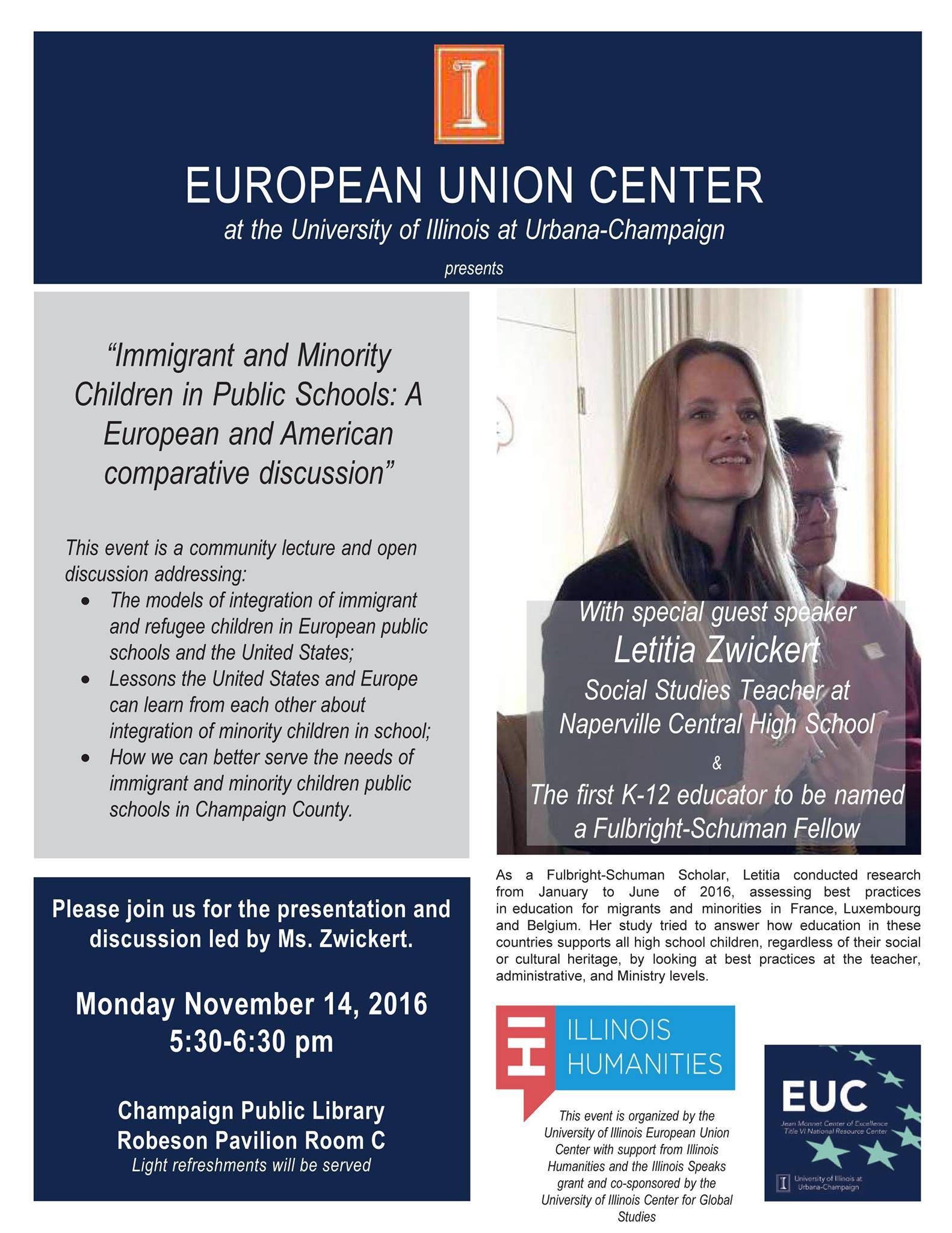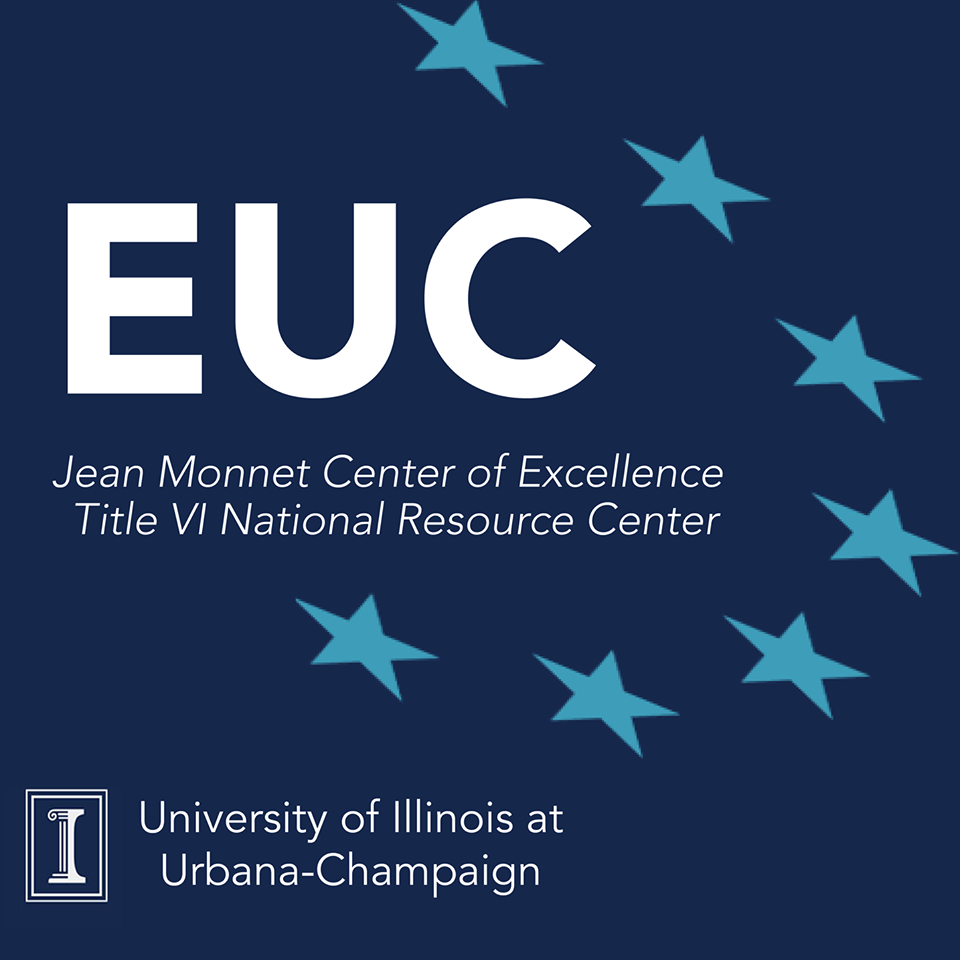In today’s political and social context it can seem, at times, that the big talking points do not directly affect us. Topics such as international trade and diplomacy can be intimidating or hard to understand, seemingly having little impact on our day-to-day lives. One international issue that affects people all over the world, and here in Champaign County, everyday, is immigration.
In 2010, across the state of Illinois 13.6% of individuals were born in a country other than the United States. In the same year in Urbana alone, 18.3% of residents were born in a country other than the United States. Two rising immigrant populations in Champaign County are Congolese and Guatemalan. And while some might be made nervous or feel threatened by the ever shifting demographics of Twin Cities and our county, it is the hope of many that we can understand the influx of new comers as an opportunity and resource.
 Tonight, Letitia Zwickert, an area K-12 Instructor, will be discussing immigration and inclusion in Champaign schools in a talk titled, “Immigration and Minority Children in Public Schools: A European and American comparative discussion.” The event, sponsored by the European Union Center (EUC) of the University of Illinois at Urbana-Champaign with support from Illinois Humanities and Illinois Speaks, will take place from 5:30-6:30 p.m. at the Champaign Public Library.
Tonight, Letitia Zwickert, an area K-12 Instructor, will be discussing immigration and inclusion in Champaign schools in a talk titled, “Immigration and Minority Children in Public Schools: A European and American comparative discussion.” The event, sponsored by the European Union Center (EUC) of the University of Illinois at Urbana-Champaign with support from Illinois Humanities and Illinois Speaks, will take place from 5:30-6:30 p.m. at the Champaign Public Library.
Zwickert has had a long relationship with the EUC consisting of notably high participation and engagement with EUC programs and events designed to teach and engage others in the area, especially Champaign County’s youth. She is also a unique and exciting speaker according to Sebnem Ozkan, the Outreach Coordinator at the EUC. Zwickert was a Fulbright-Schuman scholar, an honor typically awarded to PhDs. The Fulbright-Schuman Program “funds graduate and post-graduate study, research, and lecture proposals in the field of US-EU relations, EU policy, or EU institutions for interested American and EU citizens.” With the grant she earned, Zwickert conducted “a qualitative comparative case study from January to June of 2016, assessing best practices in education for migrants and minorities in France, Luxembourg and Belgium.” The goal of her study was to determine how these countries remain inclusive of every child at the high school level, regardless of their race, culture, or beliefs, and how that inclusion is facilitated by teachers, school administration, and each country’s respective government.
The EUC was excited and motivated to create this event because of the opportunity it presented to understand, “contemporary communities in need in Champaign County and to see how immigration influences learning,” says AnnaMarie Bliss, a PhD student who works with the EUC. The discussion will allow community members to learn about a need in the community and some of the ways that inclusion in our school system can be addressed. Understanding ways that we can make our schools more inclusive of all of their students is important because “education is for everyone,” Ozkan argued. Education is widely acknowledged as a basic human right and “legal or country of origin should not affect that,” she went on. Therefore, it is important to ensure that our schools address the needs of all of its students.
Ozkan would also like to challenge people to know their community. When people say “my community,” she asks, “What does that mean?” To truly understand the culture, values, and concerns of our community, we need to also include immigrant populations in a dialogue about their concerns. And one of the best ways to know who our community is is to look at the children that live here, because they are the future.

Regardless of these children’s country of origin, their education will be one of the primary vehicles in which they become productive and engaged citizens and members of society, Ozkan emphasized. Immigrant and minority children are going to play a large part in the future of this country and we in Champaign County should care about that on a local level. “We all have to be educated citizens when we vote on education,” said Bliss, “and when we know more about the culture of education in Champaign-Urbana we will be able to make decisions on the next ballot.” Ensuring that every child in every school can learn effectively benefits us all right now, and in the future.
And while learning about our own community and promoting the education of a quickly growing population within it, it is important to look elsewhere for lessons and ideas. There are many different diaspora, even within Europe, says Ozkan. In addition, there are many different models of integration and inclusion. Europe has no unified approach to inclusion, and by looking at different stories, models, and contexts of the inclusion of immigrant and minority in high schools around the world, we can learn a lot about best practices, and a lot about ourselves, argue Ozkan and Bliss. We can take ideas that work and modify them to best suit the needs of every student in Champaign County.

Unfortunately, a large barrier to inclusion is the choice to frame immigration and the diversity it brings as a problem. “If we keep framing the issue as a problem, we won’t be able to succeed,” Ozkan told me while discussing the issue. She and Bliss urge the community to see changing demographics as an opportunity and a resource. Be excited that your children are interested in other cultures and languages. Be excited that your children are welcoming and willing to see beyond what they experience at home. Be excited that your children are exposed to so many different ideas, which in turn gives them so many different choices. If we do that, facilitate inclusion and celebrate a child’s innate kindness, we will become a more welcoming, insightful, and compassionate Champaign-Urbana. Immigration is a complicated and challenging topic, but our response to it, in Champaign County, in the United States, and across the world can be the same. Welcome those coming to your community searching for opportunity and take the time to learn from them as they hope to learn from you.
If you are unable to attend Zwickert’s talk this Monday, but would still like to know more about how you can help make Champaign County a more inclusive community, Ozkan and Bliss encourage you to look into the following resources: Three Spinners and East Central Illinois Refugee Mutual Assistance Center (ECIRMA).
To learn more about Zwickert’s talk or EUC in general, Sebnem Ozkan can be reached via email at asozkan@illinois.edu.








